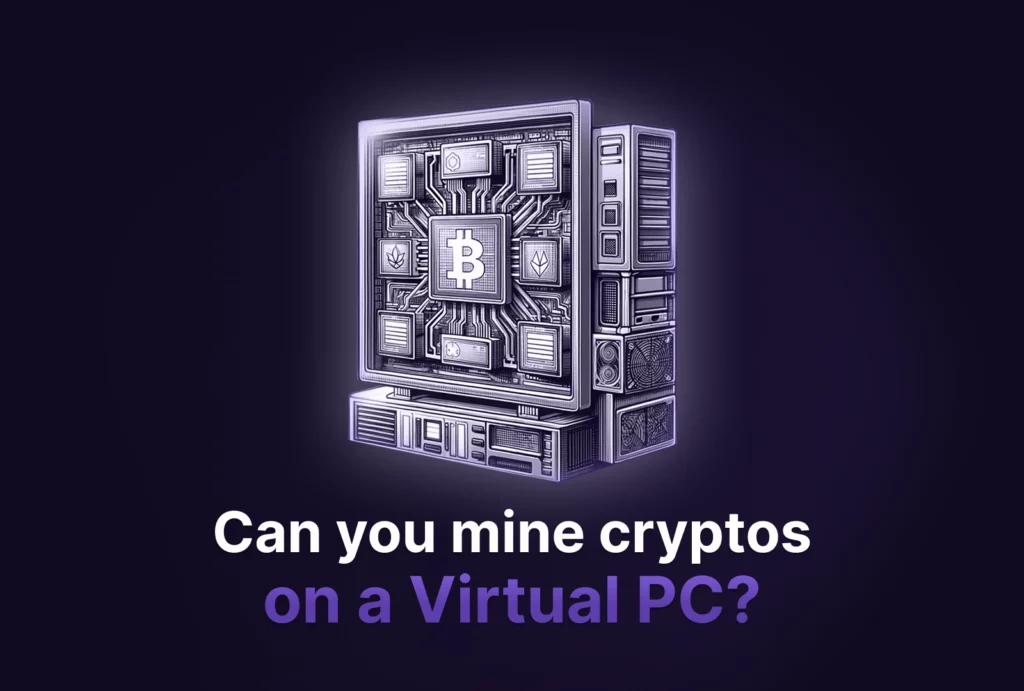Can you mine crypto on a virtual PC in 2024?
- January 9th, 2024


In the crypto mining industry, the question “Can you mine crypto on a virtual PC ?” probes the potential of virtualized environments in mining. This inquiry is pivotal in understanding new mining methodologies, especially for us as a mining pool. In our article, we will delve into the innovative yet challenging world of virtual PC mining, analyzing its feasibility, technology, and impact on the crypto landscape.
Table of contents
- Exploring the Viability of Virtual PC Crypto Mining
- Understanding Virtual PCs - The Basics
- The Reality of Crypto Mining on Virtual PCs
- Advantages and Limitations of Virtual PC Mining
- Setting Up Your Virtual Mining Rig
- The Future of Virtual PC Mining in the Crypto World
- Frequently asked questions
- Conclusion
Exploring the Viability of Virtual PC Crypto Mining
Brief Overview of Crypto Mining
Crypto mining involves validating transactions and incorporating them into the blockchain. It requires significant computational resources, traditionally through specialized hardware like ASICs or GPUs. This process has evolved from a tech enthusiast’s hobby to a highly competitive industry.
The Concept of Virtual PCs in Mining
The idea of utilizing virtual PCs, created through software like VMware or VirtualBox, offers a new perspective in mining. These virtual environments emulate multiple operating systems within a single physical system, presenting unique opportunities and challenges in mining efficiency and scalability.
Importance of Understanding the Feasibility of Mining on a Virtual PC
Assessing the feasibility of mining on a virtual PC is essential. Key factors include the performance capabilities of virtual environments, cost considerations, and potential profitability. This goes beyond merely asking “Can you mine crypto on a virtual PC?” to understanding its practicality and impact on the mining ecosystem.
Understanding Virtual PCs - The Basics
In the quest to answer “Can you mine crypto on a virtual PC?”, understanding the fundamentals of virtual PCs is crucial.
What is a Virtual PC?
A Virtual PC is a software-based emulation of a physical computer. It allows users to run multiple operating systems on a single physical machine. Essentially, it’s like having several computers within one, each isolated and capable of performing distinct tasks.
Different Types of Virtualization Technologies
There are various virtualization technologies, each serving different needs. Two popular types are:
- Full Virtualization: Creates a complete simulation of the underlying hardware, allowing an unmodified operating system to run in isolation.
- Paravirtualization: Involves a modified OS running on a fully virtualized environment, offering enhanced efficiency.
Overview of Hardware Requirements for a Virtual PC
The hardware requirements for a virtual PC depend on the intended use. For crypto mining, a robust processor (CPU), adequate RAM, and a powerful graphics card (GPU) are vital. These components ensure the virtual environment runs smoothly and can handle the intense computational demands of mining. Keep in mind, while a virtual setup might offer flexibility, its mining performance hinges on the underlying physical hardware’s capabilities.
The Reality of Crypto Mining on Virtual PCs
Delving into the heart of the matter, let’s explore whether you can effectively mine crypto on a virtual PC.
Can You Mine Crypto on a Virtual PC?
Yes, it is technically possible to mine cryptocurrency on a virtual PC. However, the efficiency and profitability are contingent on numerous factors such as the virtualization technology used, the power of the underlying hardware, and the specific cryptocurrency being mined. Virtual PCs often face limitations in accessing the full potential of the hardware, especially GPUs, which are critical for mining most cryptocurrencies.
Comparing Performance: Virtual PC Mining vs. Traditional Methods
When comparing virtual PC mining to traditional methods, the latter often outperforms in terms of raw computational power and electricity efficiency. Virtual PCs can incur additional overheads due to the virtualization layer, which can impact mining performance negatively. Nonetheless, virtual environments offer flexibility and ease of management that some miners may find advantageous.
Case Studies and Real-World Examples
Real-world examples and case studies indicate a varied experience. Some miners have successfully used virtual PCs to mine smaller cryptocurrencies, while others find the reduced performance a significant hurdle for more established coins like Bitcoin. These examples underscore that while mining on a virtual PC is feasible, it may not always be the most efficient or profitable method, especially for those aiming to mine at a larger scale.
A few cryptocurrencies that are more suitable for this approach. We can note:
- Monero (XMR): Monero is known for its privacy features and is often considered ideal for CPU mining. Its low resource consumption makes it a potential candidate for virtual PC mining.
- Ergo (ERG): Ergo is based on the proof-of-work algorithm Autolykos, designed to be ASIC and pool-resistant. It can be mined with a minimum of 4GB of memory and a full node wallet. If you want to mine Ergo, join our Ergo mining pool.
- Quantum Resistant Ledger (QRL): QRL uses the RandomX algorithm and can be mined using GPUs if you utilize a community-run pool server. It’s compatible with Randomx mining software.


Advantages and Limitations of Virtual PC Mining
In the context of “Can you mine crypto on a virtual PC?”, it’s crucial to weigh the benefits and challenges of this method.
Benefits of Mining Crypto on a Virtual PC
Mining cryptocurrency on a virtual PC offers distinct advantages:
- Flexibility and Scalability: Virtual PCs can easily scale up or down, allowing miners to adjust their operations based on current needs and market conditions.
- Reduced Physical Space: Unlike traditional mining setups, virtual PCs require less physical space, making it a convenient option for miners with limited room.
- Experimentation and Learning: For beginners, virtual PCs provide a low-risk environment to learn and experiment with mining without the need for substantial initial investment in hardware.
Challenges and Limitations Faced in Virtual PC Mining
However, there are significant limitations to consider:
- Limited hardware power: Virtual PCs often can’t leverage the full power of GPU and CPU, leading to reduced mining efficiency.
- Performance Constraint: The additional layer of virtualization can lead to lower mining rewards and inefficient resource usage.
- Components durability: Continuous mining can strain the host computer’s resources, potentially reducing the lifespan of its components.
- Market Volatility: The fluctuating nature of the cryptocurrency market makes mining a risky venture, with potential for both significant gains and losses.
Addressing Common Misconceptions and Errors
Many believe that virtual PC mining is as profitable as traditional methods, which is often not the case. It’s also a misconception that any virtual PC setup can mine efficiently. The reality is that successful virtual PC mining requires careful configuration and a solid understanding of the limitations and capabilities of the virtual environment.
Setting Up Your Virtual Mining Rig
Embarking on mining crypto on a virtual PC requires a strategic approach. Here’s how to set it up effectively:
Step-by-Step Guide to Setting Up a Virtual PC for Mining
- Opt for a Suitable Operating System: Utilize the existing operating system on your PC. For enhanced efficiency, slight overclocking of your system using tools like MSI Afterburner may be beneficial, reducing strain on the cooling system.
- Install the Right Mining Software: Download the mining software that aligns with your cryptocurrency of choice, ensuring it’s from the official site to avoid any counterfeit versions. This software will facilitate the mining process on your virtual setup.
- Monitor Energy Consumption: Given the high energy demands of mining, it’s crucial to keep tabs on your electricity usage. This helps in balancing the cost-effectiveness of your mining activities.
Recommended softwares and tools
- Mining softwares: Choose software that’s compatible with your hardware. For instance, XMRig is well-suited for mining Monero, while TeamRedMiner can be effective for Ergo. If you want a complete list of mining softwares to consider before mining, please check our dedicated page.
- System Monitoring Tools: Applications like MSI Afterburner are recommended for monitoring and tweaking your system’s performance.
Optimizing Mining Performance
- Allocate Adequate Resources: Ensure your virtual machine has access to necessary resources for optimal mining performance.
- Cooling Solutions: Implement a robust cooling system for your hardware. Proper ventilation is key to maintaining performance and extending the lifespan of your equipment.
- Join Mining Pools: Joining a mining pool like Cruxpool can increase your chances of earning mining rewards. These pools aggregate the processing power of multiple miners, improving the odds of successful mining while distributing rewards among participants.
The Future of Virtual PC Mining in the Crypto World
The future of virtual PC mining in cryptocurrency is a blend of evolving technology and shifting market dynamics.
Emerging Trends and Future Prospects
The crypto mining landscape is witnessing a gradual shift towards more sustainable practices. With environmental concerns at the forefront, there’s a growing trend of adopting renewable energy sources for mining operations. This shift is not just a response to criticism but a proactive step towards a more sustainable mining ecosystem.
Furthermore, innovations in cloud computing are paving the way for more accessible mining options. Cloud mining allows users to rent hash power, reducing the need for owning and maintaining expensive hardware. This trend could democratize access to mining, although its long-term profitability remains a question.
Can You Mine Crypto on a Virtual PC Efficiently in the Long Run?
While it is technically possible to mine crypto on a virtual PC, its long-term efficiency is questionable. Challenges such as limited hardware access, compatibility issues with mining software, and significant resource consumption can impede performance. These factors, combined with the fast-evolving nature of crypto mining technology, suggest that dedicated hardware might continue to be the preferred choice for serious miners.
Final Thoughts and Expert Predictions
Experts predict a future where mining difficulty and hash rates increase, potentially reducing profitability for individual miners. This could lead to the rise of mining pools as small-scale miners seek to remain competitive. Additionally, the industry faces challenges like chip shortages, which could impact the availability and cost of mining hardware.
Frequently asked questions
Mining major cryptocurrencies such as Bitcoin and Ethereum on a virtual PC is technically possible, but not generally efficient due to limitations in hardware access and performance constraints compared to dedicated mining setups.
The key benefits include scalability, reduced physical space requirements, and a low-risk environment for beginners to learn and experiment with mining processes.
In the long run, the viability of virtual PC mining remains uncertain due to evolving technology, increased mining difficulty, and the potential for reduced profitability.
Essential tools include compatible mining software (like XMRig for Monero), system monitoring tools (such as MSI Afterburner), and joining mining pools to enhance earning potential.
Conclusion
Embarking on the journey of virtual PC mining unlocks a realm of possibilities, yet it’s laden with challenges. As the crypto world evolves, the question remains: “Can you mine crypto with a virtual PC?” The answer lies in balancing potential gains with the understanding of technological limitations and market dynamics.
For more analysis and support, follow Cruxpool on X, Discord and Telegram. If you want to mine efficiently using GPU or ASIC, join one of our mining pools!